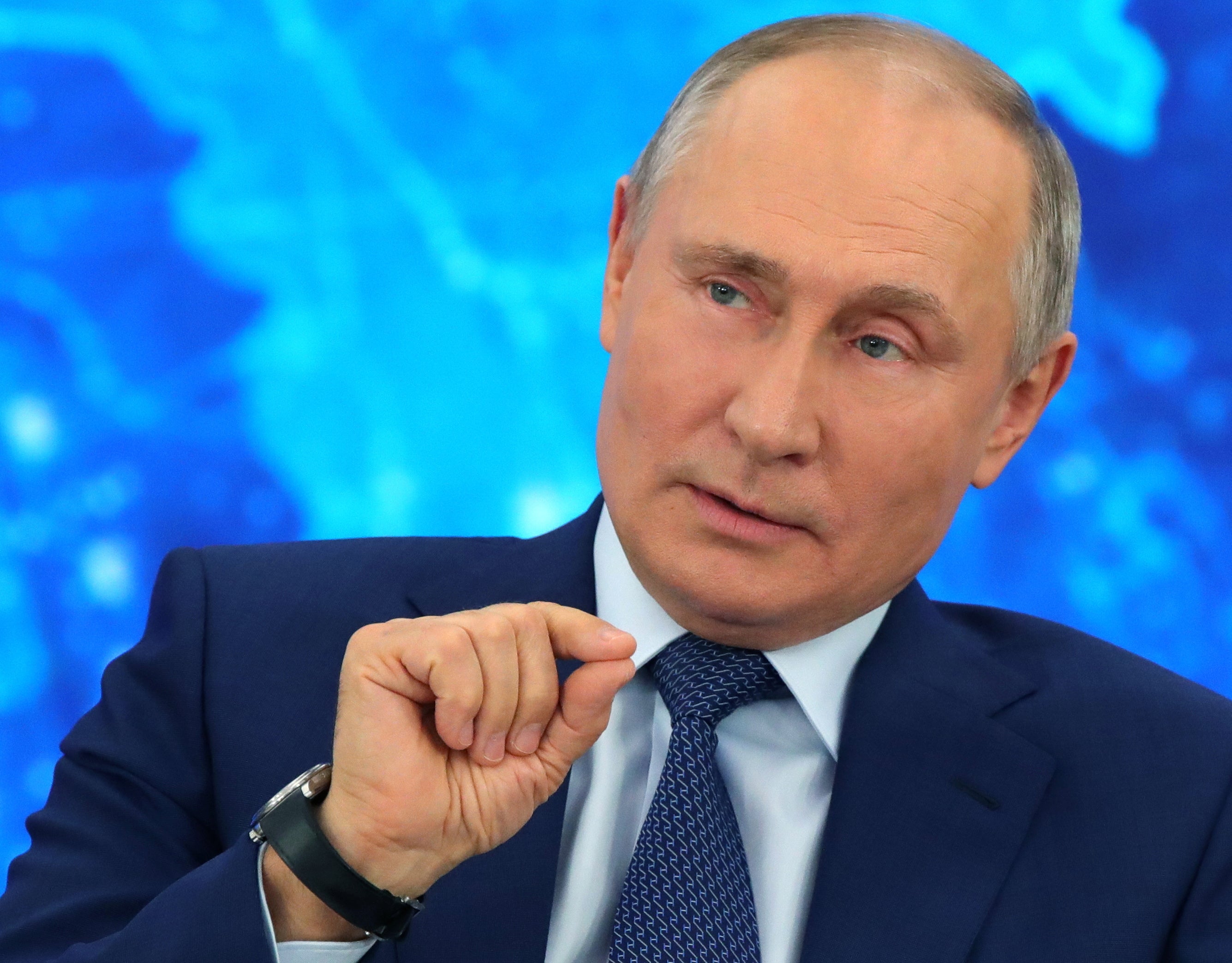Putin denies Russia poisoned critic Navalny: ‘We would have finished the job’
Russian president breaks silence on state assassination claims

Vladimir Putin on Thursday brushed aside damning evidence of a state assassination campaign against top critic Alexei Navalny by claiming he wasn’t “important enough” to be a target in the first place.
Responding to Monday’s explosive Bellingcat-The Insider-CNN report for the first time, Mr Putin said the accusations had been designed to discredit him personally.
“If [we] wanted to poison him, [we’d] have finished the job,” he said, letting out a nervous chuckle. “I gave the go-ahead to let him out of the country for treatment.”
Making the comments during his marathon end-of-year press conference, Mr Putin continued a tradition of declining to name his most prominent domestic opponent. He said western security services had most to gain from an attempt to kill “the Berlin patient,” as he described him, a reference to the German clinic that saved Mr Navalny’s life.
The Bellingcat-The Insider-CNN investigation was an attempt to “legalise” materials cooked up by western intelligence, the president added.
He nonetheless admitted officers from his security agency, the FSB, had followed the opposition leader before he fell into a poison-induced coma onboard a flight from Tomsk, Siberia, to Moscow in August.
Inadvertently, Mr Putin appeared to give credence to the mass of geolocation evidence contained in the new investigation. This data showed a persuasive picture of an elite squad of at least eight operatives with medical training and links to chemical weapons experts, who followed the opposition leader around Russia for three years prior to his poisoning.
In his comments, Mr Putin admitted Russian security agents “understood” their communications were being tapped: “Of course we know that we are being followed. But the fact that the patient is being supported by western secret services is interesting in itself. Who needs him?”
Mr Putin also appeared to contradict his own claims not to have read the report. He demonstrated knowledge of a key detail underpinning the claims – that a hapless FSB agent had left digital fingerprints by turning on his personal mobile phone at key moments in the poisoning timeline in Moscow and Tomsk.
Christo Grozev, Bellingcat’s lead author, suggested Mr Putin had chosen the “worst … of all possible defence narratives” available to him. Writing on Twitter, Mr Grozev claimed the Russian president’s account had validated “100%” of the report’s conclusions: “The only alibi was that if the FSB wanted to kill him they would have succeeded.”
The terse Navalny exchanges were the main drama of an otherwise flat event that rolled on for over four and a half hours. Mr Putin put an end to proceedings with an unexpected announcement of a 5000 ruble (£50) new year handout to all Russian families with young children.
The 2020 edition of the Kremlin’s showpiece event included several “innovations” designed for the pandemic times. The president, who has spent most of the year in isolation in his suburban Moscow residence or identikit working quarters installed near Sochi on the Black Sea, did not appear in person. Instead, he was beamed on a large screen, complete with a replica TV studio desk. Regional journalists were transmitted in from hubs across Russia in analogous fashion.
Most of the questions sent the president’s way were softballs. A majority seemed to have been curated. The all-important question on the Navalny investigation appeared to be delegated to a reporter from the Kremlin-friendly Life publication, who buried it among two other questions.
As in previous iterations, reporters and questions did not always correlate to journalism and information.
“Mr President, has the year been a bad or a good one?” (Mr Putin, appearing almost insensitive in the eye of the pandemic, said there was no such thing as a bad year). “Mr President, how will you stop foreign intervention in Russian elections next year?” (It starts with the vigilance of the people, he responded). Did Putin believe the Russian football captain deserved to suffer professionally because of an intimate masturbation video that appeared online? (Mr Putin even had a clear opinion here too: of course not, but let his be a lesson to other public figures).
The event was structured in three acts. In the first, the president was allowed to focus on the main issues of a difficult year. Broadly speaking: things may be bad in Russia, but they were worse elsewhere. The second part concentrated on who was to blame for Russia’s difficulties. Here the United States was a major focus, with Mr Putin repeating disputed claims about Nato expansion and the US reneging on missile defence promises.
Towards the end of the marathon, Mr Putin outlined Russia’s answers to such hostility, namely the “breakthrough” nuclear missile technology supposedly being developed in response to this new strategic challenge.
About three hours in, a journalist from the BBC wondered whether Mr Putin, twenty years in power, felt in any way responsible for the cascading relations between Russia and the west. Were his intentions misunderstood? Was his Russia – of Crimea annexation and Salisbury Novichok – just one big, white, fluffy bunny?
“Compared to you, yes, we are white and fluffy,” answered Mr Putin.
“We heard you say Nato won’t expand east, but you did. Just who is white and fluffy and who is spiky and aggressive?”
Subscribe to Independent Premium to bookmark this article
Want to bookmark your favourite articles and stories to read or reference later? Start your Independent Premium subscription today.

Join our commenting forum
Join thought-provoking conversations, follow other Independent readers and see their replies